Latest posts by Devin McKinney (see all)
- What John Lennon Thinks of Donald Trump - November 14, 2016
- The Meaning of Fun: The Paul is Dead Rumor - February 3, 2016
- BEATLES-STREEP-SHEA SHOCKER: IT’S NOT HER!!!! - August 13, 2015
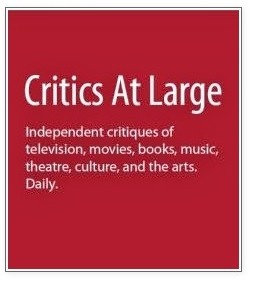 DEVIN McKINNEY • I hope you’ll all toggle over to the arts blog Critics at Large, where I’m a contributor, to read my review of Mark Lewisohn’s Tune In, volume one of his three-part Beatles biography.
DEVIN McKINNEY • I hope you’ll all toggle over to the arts blog Critics at Large, where I’m a contributor, to read my review of Mark Lewisohn’s Tune In, volume one of his three-part Beatles biography.
I know, posting that request here is a bit like asking one’s lover to have dinner at the home of another. But I’m proud to post stuff over there, where it’s in super-fine company. And besides, all of us here in the free-content blogosphere need to help each other out.

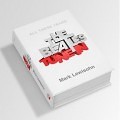
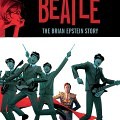
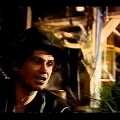
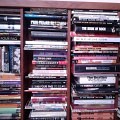
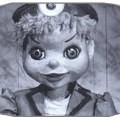
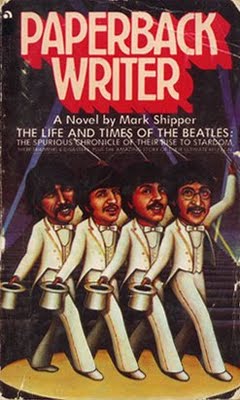
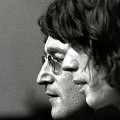
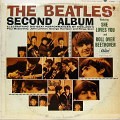
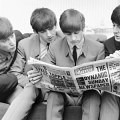
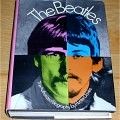

Thanks for sharing that review. I haven’t yet read the book, but one detail caught my eye: the birth of the Beatle Haircut, October 1961. I know that Astrid convinced them, through Stu, to adopt the style, but did it really originate in France. Here is a brief clip of a forgettable Cliff Richard film from 1959 (most likely filmed late 1958). Some of the young men (not all) sport what looks like pre-historic Beatle Haircuts:
http://www.youtube.com/watch?v=mKUI8FicEKk
I’ve always wondered how this hairstyle came about. I remember in the U.S. “Meet The Beatles” liner notes, there is a discussion of “pudding basin” haircuts which date back to ancient times. Nowadays we (or at least I) take their look for granted, but when I stop to think about it, how bizarre it must have been for John Paul & George, who grew up with the teddy boys and idolized American rock acts with brylcreamed pomps to adopt such a look. I remember 1964, my uncles insisting they wore wigs.
The Beatle haircut began with Klaus, then Stu. Even though John and Paul ridiculed Stu for the hairstyle, a few days afterward, George combed his hair forward for one on-stage performance and promptly returned to the quiff. John and Paul were very late to the game.
I think I read somewhere that Astrid was inspired by Jean Cocteau’s 1950 film Orpheus, but I never saw a Beatle fringe on any of the male characters. My amateur psychologist opinion is that Astrid got a sexual thrill when her men looked like her.
I also remember seeing Adam Faith with his hair scraped forward on one of those old Jack Good television shows before 1963, but it was more of a Roman emperor-do than a Beatle cut.
Devin, that was an exciting review! I can’t wait to get the extended version and tackle the footnotes first. Very well-written!
Thank you very much, JR. The extended edition is a beautiful object, and worth the price if you’re willing to buy it from Amazon.uk and wait a bit longer. Some of the pictures are incredible (whereas the photo inserts in the mass-market edition are, if anything, underwhelming).
Sam, Lewisohn put that “birth of the Beatle haircut” in quotes, I think, because he was referring to the day John and Paul got their hair cut down by Jurgen Vollmer. (That was the address of Vollmer’s Paris apartment.) Lewisohn is quite clear that the style existed already in Hamburg, Paris, and other bohemian spots in Europe. Birth of the haircut itself, no, but birth of the Beatle haircut? Yes, by virtue of that being the first time it sat atop a Beatle head.
And thanks for the video clip from “Serious Charge,” never even heard of that movie. I do love “Expresso Bongo,” with Cliff and Laurence Harvey, though it’s been ages since I saw it. Great dirty 50s Cockney atmosphere in that film.
Check out the dude in this clip from “Serious Charge” … he appears at approximately 2:07 minutes. He looks like he’s right out of the Hard Day’s Night film, but this movie is from 1958/1959.
http://www.youtube.com/watch?v=k2rs5xybX2w
This is probably a minor part of the larger Beatles legend, but I’ve always been fascinated by their “look” because when they arrived in the U.S. it was like a gang of transvestites had invaded show business (if you read accounts in the New York Times. I remember after the Ed Sullivan appearance, people couldn’t stop talking about their hair, as if it was the weirdest, sickest thing, heretofore unheard of.
I was in elementary school when the Beatles hit America. I remember teachers and classmates insisting they wore wigs. People couldn’t get over their look. Ten years later, as an obsessed teenager in the 1970s, I used to haunt our public library and read old magazines from 1963/63… Time, Look, Life as well as newspapers. All the journalists were amazed at the weird hair. “Their faces covered by manes of wild hair” …reportage like that. All the articles about the Beatles made them sound like freaks, because of their hair. Beatle wigs were worn by comedians. It was considered a freak show.
Looking back, from the year 2013, I understand that musically they weren’t playing anything that hadn’t been heard from the 1950s rockers (aside from J&P’s remarkable songwriting talents) but it was their hair that all the early U.S. journalists couldn’t get over. Was it the same in the U.K.? That’s why I’m fascinated to see this Cliff Richard film from the ’50s, with British guys sporting Beatle haircuts before there was a Beatles. If JPG&R had appeared in America with Frankie Avalon hair, would there have been such an uproar in the traditional press? And if there had been no Beatles, would the whole 1960s long hair hippie thing have happened anyway?
Excellent review, Devin—I’m getting the book for Xmas; perhaps we should have one post per chapter, where the commentariat can talk over the issues raised in each one?
Thanks, Mike. I do expect and hope to see some commentary on this unmissable book at Hey Dullblog over the next several months!
This review only fired me up even more to get started on it! Standard edition just arrived in the mail today — I have the time to read right now, but not the money to buy extended till later, so… in . 2014 I’ll just double back and re-read with the extended at some point. Love Michael’s idea for the chapter chats!
The Beatles haircut DID NOT begin with Klaus. That’s one of the long-standing factual errors that Lewisohn corrects in this book. According to Lewisohn, it was Jurgen Vollmer who first had the haircut, and who first brought it back from France. Astrid got the idea for the cut from Jurgen. And it was Jurgen who gave John and Paul their “Beatles” haircuts in Paris.
I’m enjoying and kind of awed by Lewisohn’s book. I’m more than halfway through. And the only thing that bothers me — and also bothers me about Devin’s review — is how Lewisohn romanticizes John’s faults. Devin: Your review describes Paul as “self-centered” but wasn’t John supremely self-centered, too? Why are these negative appellations attached to Paul with no elaboration. Lewisohn’s book does the same thing. In Tune In, John’s rage and abusive treatment of friends and women are given context, and rationalized in a way that almost excuses the behavior. John’s behavior is excused and romanticized. By contrast, Lewisohn never romanticizes Paul’s faults. There’s never any context for Paul’s bad behavior. It just is. You gain no understanding at all from Tune In for why Paul was so resistant to being told what to do — by anyone. Where did that come from in his character? We’re never told. You gain no understanding of where Paul’s ambition came from or what the impact of his mother’s death is on Paul. He’s just portrayed as this nice, yet almost coldly ambitious person who never comes to life on the page; he’s almost inhuman. Lewisohn repeatedly treats John’s behavior in almost a sympathetic way yet treats Paul in a clinical way. And George doesn’t fare any better. George doesn’t come to life in this book either. You gain no understanding from Tune in for where George’s contrarian streak came from at all or what about George’s upbringing made him this way. Reading this book, I felt the usual discomfort that once again we have a writer who is far too enamored with John, at the expense of understanding Paul and George.
Drew, I wrote that “Paul McCartney was also singularly ambitious and serenely self-centered.” Note the “also”: this was just following on from the preceding sentences about Lennon, in which ambition and self-centeredness seemed to me implicit.
Another thing to keep in mind is that this is only the first few years of their story. There’s simply no denying that Lennon is the dominant force, the driver, the leader, the one the others are imitating. He leaves the most behind in terms of artworks, writings, and heavy impressions on others. Paul and George have not begun to exert nearly the influence they will in years to come.
And something for ME to keep in mind is that Drew is right. I do give John a bit of romance where I don’t Paul. Simple as that.
Thank you for your response and your honesty. You’re certainly not alone in romanticizing John’s faults. I think Lewisohn and most Beatles writers do that. I suppose it’s partly because if they don’t, some of John’s behavior makes him seem like, well, a complete jerk. So writers feel the need to explain, offer context, and emphasize John’s magnetic personality or his troubled homelife or how sweet he could be. The problem is they don’t make the same compensation for Paul. I’m not sure why writers are protective of John but not of Paul. They often just spell out Paul’s faults — and we all know he has his share — without any context or explanation or empathy. Nothing is romanticized about Paul. He’s described as calculating, ambitious, selfish — and nothing else. It’s like there’s nothing offered to counter that and help us understand his great insecurities, his tendency toward introversion (contrary to his stage persona). It would have been nice to read more about his childhood in Tune In to help us understand how he came to be this way, but there’s little or no detail. John was “calculating, ambitious, and selfish” too. It’s just that Lewisohn goes out of his way to balance and soften those faults for John.
A good example in Lewisohn’s book, since you mention artworks: Tune In goes into detail about John’s art and cartoons and writings. But then we find out in a sentence — one sentence– that Paul as a teen was well known in school for his cartoons, but we learn nothing about what he drew. Then Lewisohn tells us Paul won first prize in a schoolwide art contest — again in a sentence — but he never tells us anything about the art itself or what sort of art Paul was known for. I find that inexplicable. Lewisohn interviews a lot of people to fill in the gaps about John but Lewisohn chose not to interview as many people to fill in the gaps about Paul and George, too.
I didn’t learn anything new about John’s childhood from Tune In — except that bit about how the famous scene where John was forced to choose between his parents at age 5 never happened. Other than that, I’ve read all of his childhood history before. I’ve already read as much as i need to know about John’s childhood.
What’s great about Tune In is that it does give us a tremendous understanding of Ringo and his early years. I had no idea about his traumatic upbringing. It’s just too bad that Tune In fails to offer a more complex portrait of either Paul or George. That, to me, is the fascinating question: Here you have George — raised in the most stable home of all 4 Beatles with an intact family unit — so how on earth did he become the contrarian he is at such a young age? George was dressing provocatively and challenging authority at every turn. But nothing in the book helps us understand George’s development in that contrarian.
Don’t get me wrong: It’s over all a terrific book. I just don’t understand some of the things Lewisohn chose to emphasize and not emphasize. Thanks again.
Speaking generally (since my copy is coming at Xmas…I hope), there are a couple of things from my own life that seem to explain this issue, @Drew.
It’s been my experience that addicts manifest certain extremes in personality—they’re really magnetic, and really repulsive. Sometimes the one follows so quickly on the other, it’s mind-boggling—he’s hilarious, he’s selling your stuff; she’s the best company ever, she’s breaking the TV in a rage. There’s a peculiar intensity that only addicts possess, and whenever I sense it, sure enough the person has some sort of chemical problem. Maybe you see it immediately, maybe you see it after six months of dating, but in 44 years it’s never not been there. The charm’s almost like an adaptation on the part of the drinker to keep enabled.
Speaking of alcoholics specifically, a lot of them cut terribly romantic figures, especially when young, when they’re super-functional and the disease hasn’t really begun to wear them down. They seem to live MORE than everybody else. Really charismatic, romantic self-mythologizing—these are just what showbiz is looking for, right?
John Lennon was “calculating, ambitious and selfish” but that’s not what made him stand out to people (and only certain people). What made him stand out—what made him magnetic, romantic, destined for great things—was the same parts of his personality that made him an addict, first to booze, then to pills, then to weed, then to acid, then to heroin…It’s like a dog whistle that early proximity to addiction makes you able to hear. Paul heard it; Brian heard it; millions upon millions of fans heard it and still hear it.
Paul might be some kind of addict, I don’t know, but he wasn’t from the same section of the shop as John. Charming, for sure, driven—but not violent, not tragic. So suddenly we can see how Paul could also be “calculating, ambitious and selfish” but not as desperately magnetic at 18; we can see how Paul can have the same talents (writing, art, etc) but not exert the same kind of cellular pull on some people. And it’s the susceptibility of certain writers—I’m looking at you, Mr Norman; Mr Wenner—that is interesting here, and I would be willing to lay down money that one’s amount of raw Lennon-love tracks with exposure to addictive personalities in the family.
The drama of John’s entire life, the endless self-mythologizing he did, the mercurial changes, everything up to and including the culminating tragedy, is nothing new to anybody who’s grown up in an Irish Catholic family full of drinkers and caretakers. It’s the same old story, only more so.
Paul’s a different, complementary, species. If John’s the brilliant but wild cousin who ends up in jail or goes crazy—and isn’t that a tragedy—Paul’s his brother who tries to keep things on the rails, and who silently smolders because he’s just as talented as Mr. Crazy, and tires of cleaning up his messes, and wonders why nobody thinks HE’s a genius, too. Paul’s the brother constantly trying to prove he’s just as special, until the day he dies. MORE special, because he’s a good boy, too.
As to George, remember he’s the youngest of four. Birth order should explain some of his early traits, right? One needs the baby child’s unassailable sense of self-worth—and need to stand out, to assert oneself—to dress provocatively and challenge authority. And “baby brother” was the role he played within The Beatles—just ask Paul. But making George lesser was how Paul—a firstborn by birth, but caretaker by necessity—dealt with being subordinate to John, another firstborn. And this dynamic explains why George tried to go over Paul’s head to John, why the trip to India meant so much to him, why Paul left early, and so forth. It also explains why everybody could leave The Beatles but Paul.
None of this is difficult to figure if you apply a certain kind of emotional intelligence to it; but that sort of thinking isn’t considered cricket when it comes to biographies. It’s not “provable.” But it seems like the very marrow of what biographies are supposed to do.
I think you’re right, Michael. I’m probably expecting too much psychological analysis and that’s not Lewisohn’s bag. It’s just that, in reading, I felt that he did sometimes try to contextualize John’s misbehavior (which has the perhaps unintended effect of softening its impact) and he rarely does that for Paul. Lewisohn explains the “why” of some of John’s awful actions but doesn’t tell me the “why” of some of Paul’s selfish actions.
If a bit of romanticism attaches to my description of Lennon (I did mention Lord Byron, after all), it’s not because I mean to extenuate, minimize, or otherwise excuse his brutalities, physical and emotional. I mention those in the review, too, and Lewisohn certainly doesn’t shy away from them. But the fact that Lennon was a bully, abuser, and quite often “a complete jerk” is, I’d think, so well-established by now that it doesn’t require emphasis. That Paul could just as bastardly, however, does bear emphasizing, given that he still labors under the identity that, to be honest, he helped build — the “nice guy” to John’s sneering cynic.
Your misgivings about the book are interesting, Drew, and given what you want to see in the book, valid. That’s a very good point about him not following up on Paul’s art. Does it still exist? What did it show? What was his style? And I see what you mean about a certain imbalance of emphasis and perhaps intensity in the relative portraits of the three early Beatles (how do you think Lewisohn is doing on Ringo?). But for various reasons, I accept those biases, if biases they are, and excuse them. Particularly because, even if there are gaps in Lewisohn’s research (surely he missed a few things on John as well), all the Beatles are coming off the page as they never have before. That means P and G as well as J.
You’ve made me think a little bit more about this. I stand by what I wrote, and Lewisohn’s book can certainly stand for itself without my defense. And as I say, the test of this will really be the other two volumes, when Paul and George come into their own as not merely determinant but dominant figures in their own right.
Devin in answer to your question about McCartney’s early art work, there is a photo of him taken by his brother that shows him at the age of about 19 or 20, sitting on the floor in front of two paintings. One can clearly be seen in the photo. It is an excellent self portrait done probably six months to a year earlier. The other painting is an interesting abstract. Given the fact that Lewisohn seems to quote a lot from Mike’s books, I’m pretty shocked that he never saw this photo and these paintings. I’m pretty disappointed that Lewisohn doesn’t talk about either the paintings or Paul’s obvious artistic talent. I thought for sure he would be different but sadly I agree with Drew that there is precious little about Paul in the book…at least the one I’m reading which is the mass market version. However I don’t feel that Lewisohn necessarily romanticized John, or that he comes across in a better light. And Lewisohn does mention something that no other author has gone into much detail about….Paul’s chronic anxiety that often ruined his auditions and performances and often ruined his chances of being noticed as a talent. Kudos to Lewisohn for writing about that. I did order the extended version from Amazon U.K. so I’m looking forward to reading “everything he wrote”.
Devin, I hope Lewisohn reads your review, as I’m sure it would hearten him to read such a detailed and well-reasoned appreciation. One reason I’ve been not-so-excited about the prospect of the book is that it could so easily sink under the accumulated weight of fact, as you say. That Lewisohn has apparently gotten it off the ground, freighted with information as it is, is an amazing achievement.
George Martin turned the Beatles down twice? John and Paul didn’t meet at that fete? Now that’s some astonishing research. And it makes me wonder why the received version of these events has been repeated so often and gone largely unchallenged.
I haven’t read any of the book, but on the whole question of Lennon’s charisma, I think Michael is right. It’s partly his lack of control — his lack of boundaries — that makes him such a riveting figure. McCartney survived by a kind of splitting that kept his private self hidden. As much as Lennon wanted to run away from fame at times, he was also willing to engage an interviewer or an audience more directly than McCartney, and that makes him a hero to many. And I think it IS heroic that he managed to use his pain and neediness to make art of such quality. McCartney, while he certainly needs and appreciates an audience, keeps the boundaries in place. He’s never going to break the fourth wall. I think that’s a big part of what’s behind the resentment some writers seem to have towards him; they know he’s holding out. I consider it a much more sustainable and sane response to fame than Lennon’s (and it’ s pretty similar to Bob Dylan’s, IMO), but compared to Lennon, McCartney is always going to seem deliberately elusive and guarded — and thus resistant to biography.
@Nancy, I think Paul’s guardedness is what has kept him from attracting the crazy fans that John and George did.
I’m also interested in this George Martin thing!
Thanks, Linda. I’ve actually seen some instances of Paul’s adolescent artwork; if I’m not mistaken, some is reproduced in the Beatles Anthology book. My point was that Drew made me ask those questions, and they’re good questions. I’ve not seen enough of that boyhood work to have any clear sense of what Paul’s perspective might have been then, as expressed in his art; he’s certainly never done much to showcase that work, as John always did. Maybe he’s afraid fans would resent him for trying to “usurp” John’s mantle as the “writing, drawing” Beatle.
Everything Mike says about the addictive extremist and the “good boy” who cleans up/pulls back/keeps things running rings true to me. The one thing it doesn’t explain, and for that matter that Lewisohn doesn’t explain either (though I’m less intent on finding “explanations” in biographies than other people), is the firm and wild streak of bloody-mindedness that shows up in Paul on the oddest occasions. E.g., Epstein makes an appointment with the Beatles for one of their earliest and most important meetings; Paul, alone of the four, doesn’t show, and doesn’t send word. Someone is sent to his house, and it’s found that Paul is there, awake and all right; he’s just going to take his time about getting ready, he’ll show up when he wants to show up, and if Epstein doesn’t like it, he can stuff it.
That’s the sort of stunt that John pulled every other day, but Paul only rarely, and often at the worst times (what I meant by “suicidal”–hmm, and “I Call it Suicide” was one of Paul’s very earliest compositions … ). Maybe Mike can elucidate this dynamic further: the “good boy” whose rare “fuck you” comes only when it could really hurt him. There are obvious psychological conclusions we can draw from Paul’s decision to “show two fingers” to the band’s savior at this pivotal moment, but the point is that such brazen power plays are well outside the realm of McCartney behavior as commonly established: he has always been painted, not least by himself, as the one who cared most about assuring the Beatles’ success, promotion, legitimacy. (This is one reason I reassert that, yes, Lewisohn is presenting plenty of new stuff on Paul, and forcing us to revise our view of him; maybe it’s not a revision that a lot of people will like, but it’s there, and it’s there to be dealt with.)
Mike’s commentary also goes to the nature of Lennon vs. McCartney as a biographical subject. Nancy’s right on the mark about this. Why are there so many solo biographies of John, and only a few of Paul? It’s not because all biographers are Jann Wenner — just weak-at-the-knees in love with John, or in Yoko’s pocket, or whatever. It’s that John brings all the extremes, both by nature and by conscious indulgence, whereas a huge part of Paul’s whole story has been the avoidance of extremes, the maintaining of balance and, as Nancy points out, distance. Paul has always admitted he was the last to try a drug or TM or some other “new thing” the others were into; always admitted he was afraid that thing would take him too far away from base, and he’d never be able to “get back.” John never wanted to “get back,” he just wanted to get there. And then get somewhere else.
There are fascinating psychological dynamics in Paul, but by their nature they make for a less, not more, alluring public life. The subject has to meet the biographer halfway, or at least a third of the way: even Paul’s more-or-less autobiography, Many Years from Now, the self-constructed showcase where he can really let loose and choose to tell us what he’s about, is simply not riveting to read. On every page, in every quoted sentence, is the measured cadence and self-censorship of a man monitoring, and editing, his image in others’ eyes.
Paul, as has been noted many times on this blog and elsewhere, has spent the majority of his life hiding, repressing, putting gates around, and generally stuffing back whence they came all the extrusions, excesses, and evidences that would point a biographer to where the real meat of McCartney lies. Lewisohn spends a lot of time, for instance, getting at Paul through his brother Mike, who speaks and writes insightfully of the home relationship, the sibling relationship, the larger social relationship the brothers inhabited. Why such reliance on Mike? Could it be because Paul hasn’t been the ones to give those insights?
To that point, bear in mind as you read Tune In that it contains many, many interviews with people who knew Paul back then, and numerous quotes from letters he wrote from various places. If the view of him that comes across seems vague or undetailed to people, we can conclude that it’s partly because that’s how Paul himself has often come across to people, especially in early days before he, unlike John, had much sense of his own identity in the world. (On the evidence, for instance, his letters simply aren’t as revealing, or as quotable, as Lennon’s.) There’s only so much a biographer can do with what isn’t there to be seen, because it has been reflexively and systematically hidden by the subject over the course of a private life and deceptively public career.
A thing I want to note about Mark Lewisohn vis-a-vis Paul, and then I’ll shut up about this, having had my word: Lewisohn entered the Beatles’ inner circle through Paul. He has interviewed Paul more than a dozen times since the mid-1980s (one interview, a long and, by Paul standards, revealing one, served as the introduction to the Recording Sessions book). He was called on to do the liner notes for Wingspan, Flaming Pie, and the 25th-anniversary edition of Band on the Run. As Paul is surely the most Apple Corps-conscious of the surviving Beatles, it has to have been he who assured Lewisohn’s continued access to the Beatles’ private corporate stuff. So if anything, we would expect his portrait of Paul to be, if only inadvertently or innocently, more positive, less “bastardly” than it is; and we’d also expect that if Paul wanted Lewisohn to know about, say, his boyhood art, he’d have given him the entree, or at least the pointers to further research, long ago.
Of course, those who want a different Paul to show up in Lewisohn’s pages will not be mollified by any of this, and will speculate that he’s only overcompensating in the other direction — showing that he’s not under Paul’s thumb by hollowing him out, making him a cipher. I simply don’t think that stands up to the reading. My recognition of and respect for Drew’s misgivings fully noted, I remain not only satisfied but thrilled and impressed with the way Paul is developing thus far in Lewisohn’s biographical project (which, I repeat, is only one-third begun, and nowhere near its heaviest Paul-determined phases). Paul is, thanks to Lewisohn, now alive for me in a way he’s never been before. It’s January 1, 1963, and Paul, like John and the others, is scary, unpredictable, full of unformed talent and world-conquering potential. That may not add up to “explained,” but for me, it assuredly adds up to “alive.”
“There are obvious psychological conclusions we can draw from Paul’s decision to “show two fingers” to the band’s savior at this pivotal moment, but the point is that such brazen power plays are well outside the realm of McCartney behavior as commonly established: he has always been painted, not least by himself, as the one who cared most about assuring the Beatles’ success, promotion, legitimacy.” I’m not sure why Paul resisted Brian (and Lewisohn provides no real explanation) but it could be, in part, because Paul sensed immediately Brian’s bias toward Lennon and was suspicious of that (and rightly so, as it turned out, given than Brian would soon side with John and pressure Paul to change the writing credit to “Lennon-McCartney).
But I’m puzzled here, Devin, why you are surprised to find a portrait of Paul in Tune In as far more complicated than just the “nice” Beatle? I thought that was well known. Beatles books from such authors as Philip Norman, Peter Doggett, and Peter Brown have for years been painting Paul as calculating and manipulative and ambitious. John Lennon was saying that about Paul in interviews and in songs. We knew that already, didn’t we? That’s precisely why I’m disappointed — somewhat — in Tune In. I was hoping Lewisohn would be different. What I was hoping from Lewisohn was a more balanced portrait of Paul to counter the negative portrait of him that I’ve been reading about for years. Lewisohn is certainly more fair than that awful fictionalized account written by Peter Brown and more balanced than Philip Norman. But it’s just not as balanced a picture of Paul as I had hoped Lewisohn would offer. A person who is ONLY calculating and manipulative and ambitious doesn’t manage to remain a central figure and a co-leader of the Beatles for 12 years without other positive qualities, does he? Brian Epstein and John Lennon could be mercurial and nasty but we also find out about their positive qualities that made people overlook such behavior from them. So what did people LIKE about Paul? John and George — these blunt spoken men — must have liked him on some level or Paul wouldn’t have stayed in the band. Why did George go hitchhiking with Paul? Why did John invite Paul to Paris, out of all the people John could have taken? What were Paul’s positive qualities to balance all that ambition and stubborness? I don’t get a good understanding from Lewisohn for what they liked about Paul. Why not balance the negative with helping the reader understand the positive aspects of Paul — just as these books always go out of their way to balance John’s worst traits by showing his positive qualities. Another example: There’s a sentence in the book where Lewisohn writes that after four years of friendship with John, Paul had learned how to intervene and calm the waters when John had offended someone and things were about to get ugly. I would have liked to read some examples of that, as I consider that a positive trait of Paul’s and a hint at the complicated nature of the John-Paul dynamic. But Lewisohn says that in a sentence and leaves it at that.
I know you’re much smarter about these things than me, having written a great Beatles book yourself and being a good writer whose book I enjoyed. But I confess I enjoyed Many Years From Now. I think it’s a terrific account of Swinging 60s London and of Paul’s role in that. I really don’t see how people can say Paul hasn’t revealed much when most of the most damaging information that we know about Paul CAME FROM PAUL!!! The comment that Paul said about his mother’s death (“What are we going to do without her money?”) came from Paul (He told Hunter Davies about that). The story about Paul preparing for national service and a stint in the army by killing frogs at age 12 came from Paul. The fist fight that Paul had with Stuart came from Paul. The idea that Paul was jealous of Stuart came from Paul. The details about Paul’s resistance to taking LSD and other drugs came from Paul. Many of those details were in Many Years From Now, and for years Beatles writers have been mining that book and using it as a reference and it shows up a lot in Lewisohn’s footnotes (as it does in the footnotes of Doggett’s book and of Revolution in the Head). I don’t know. I think Paul has been far more revealing than people give him credit for.
I should emphasize: I don’t think Lewisohn gives a negative portrait of Paul. He does detail Paul’s almost effortless musical genius. He does gives examples of kind things Paul does here and there. I just thought the portrait of Paul — and of George — is sketchier than I was expecting and a bit more clinical than the portrait of John.
Very, very good point about the way John is depicted vs Paul. Poor Paul always get the short end of the stick for some reason–maybe because it’s so easy to romanticize the rebel vs the goody-two-shoes.
Another thing–I don’t think Lewsohn makes a definitive case for the blackpool-incident-didn’t-happen. He based his “conclusion” on the opinion of of someone who wasn’t in the room. That person doesn’t know what took place between Fred and Julia. Why would Fred make up that story? It doesn’t paint him in a good light at all (in fact, his friend’s version is more sympathetic to him). What Fred told him afterwards (John is going to live with his mom for his own good) doesn’t negate the incident whatsoever.
Devin, I really want to hear more about George Martin’s early rejection of the Beatles! How did your impression of Martin change (if it did) as a result of the book?
Drew, don’t minimize your voice or maximize mine. You’re making your points quite effectively, thank you. That’s why I always say that criticism, solo or in dialogue, is not about proving ME right and YOU wrong. It’s about explaining how I feel, then listening to how you feel, and maybe coming out with a changed perspective. You’ve already done that for me, and I thank you. It all goes into the hopper.
Nancy, I wouldn’t ruin the Martin story for you by revealing it before you have a chance to read it. And besides, I’d need to have the book right here with me and pretty much quote it verbatim to get it right: it’s really a very complicated story. And note that about a tenth of it is speculative on Lewisohn’s part: that’s why I used the qualifier “likely.” It doesn’t change my view of Martin’s centrality or his genius additions to their mix, but it suggests to me that like almost every major player in the Beatles’ story (Allan Williams, Brian Epstein, Paul, John and Yoko), Martin long ago adopted a “version” of events and has held to it, from “Cellarful of Noise” to the Davies biography to “All You Need Is Ears.”
And now I will REALLY shut up.
the “good boy” whose rare “fuck you” comes only when it could really hurt him.
Well that’s when people would really notice, right?
The pre-Brian Beatles had been a John-and-Paul crusade. The introduction of Brian wouldn’t diminish John, the acknowledged leader of the group; but it makes perfect sense that a 19-year-old Paul would feel threatened. Especially since it must’ve been totally obvious that Brian fancied John. Think about what managers were, in those days, and groups too; Paul very well could’ve been worried that Brian might talk a good game about treating him and John equally, then turn them into Johnny and the Moondogs after getting their names on the dotted line.
The essential thing to remember about Paul is that he feels just as deeply as John; his childhood was damaging, too; he was just as desperate to get out of Liverpool and become a star. The things that drive Paul are just as savage and uncompromising as the things that drove John—maybe more so (can you imagine Paul taking a five year hiatus from making music?). Paul doesn’t put up barriers just to keep people out, but also to keep certain things in.
Why? Because of his second-banana, reactive, two-years-younger caretaking role, he’s actually under a lot more pressure than John. John can just be John; Paul has manage things. John can loaf; Paul has to work. Paul has to be John’s artistic equal, AND take care of all the shit that John doesn’t want to (PR, for example), AND clean up John’s messes. The only way one can cope with this kind of thing is by committing to the group endeavor utterly—to give everything you’ve got to the idea of The Beatles, to identify it as you and you as it. And even so, the anger and resentment underneath is bound to come out occasionally. It has to.
It wasn’t Paul’s fault that John drank too much, or had conflicted sexual feelings, or got Cyn pregnant, or found himself in an unhappy marriage in the suburbs—but it was Paul’s problem, almost as much as it was John’s. John could not have gotten through any of those things intact without Paul’s help. Which John surely saw and resented, not only because it made him feel weak, but because sometimes someone WANTS the whole thing to explode. Paul always assumed that John wanted the show to go on—the original terms of their friendship—and you can’t blame him for that, but certainly by the Yoko years John is aching to self-immolate. What’s so appalling about “Lennon Remembers” though, is how John reams Paul for being square and “the world’s greatest PR man” when both of those things are exactly what John turned him into. And he knew it, and Paul knew it.
Meanwhile, Paul saw and sees people worshipping John and Jesus, it’s got to rankle. Nobody, especially not a certain kind of Lennon fan, ever pipes up and says, “You know, the Bed-Ins only happened because Paul kept John alive, productive and out of jail for a decade.” It’s one thing to love a guy so much you devote your life to him (which is what Paul did from 1957-1967); it’s another to have the fans and press—egged on by the guy himself—criticize you and call you uncool for doing exactly that. (In some weird way, I’d argue that Wenner disliked Paul because Wenner wanted Paul’s job!)
It’s not John or Paul, it’s JohnandPaul, and while John’s damage (and narcissism) makes it easy to see John’s part, Paul’s role obscures what he did and why, and who he was, and why. In that kind of situation, the occasional “fuck you” is inevitable; and it’s equally inevitable that it would come precisely when it might bring the whole edifice crashing down. “You think this group is about John? You think he’s the genius, and I’m coattailing? You think I’m the happy chappy who just likes to write tunes? Well FUCK YOU.”
“In some weird way, I’d argue that Wenner disliked Paul because Wenner wanted Paul’s job!”
Spot on, Michael. I’d also put Robert Christgau and Philip Norman in the writers’ I-would-have-been-a-better-buddy-to-John club.
I agree with you, too, about the probable reasons for Paul’s occasional high-stakes acts of defiance. If I remember correctly, he said something about the time he stood up Brian and the rest of the band as triggered by his resentment at always being the taken-for-granted “keeny” in the group.
And — good point that guardedness is probably a big part of the reason Paul hasn’t tended to attract passionate/unbalanced devotees in the same proportions as John and George. Actually, I realized after reading through the exchange about how Paul is represented in Lewisohn’s book that at one level I root for Paul to evade some scrutiny, as he at least often seems to want. Really, apart from the writers who unfairly axe-grind on McCartney, I can’t blame anyone for not “getting” someone who really doesn’t seem to want to be gotten.
Devin, you’ve inspired me to go to Lewisohn just through those George Martin references! Nicely done.
You nailed it Mike. I’d like to cut and paste your post to every criticism I see of Paul on-line and mail it to every author who patently misses this point, time and time again.
Thanks, @Karen! Each one teach one, I say. 🙂
First Devin, I want to tell you that I finally read your review (I read the comments here first) and I really enjoyed it. The way Lewisohn makes the Beatles come alive on the pages of his book, you make his book come alive with your review.
I also enjoyed your reply. Please don’t “shut up about” it because everything you say here are points well taken and this is a very interesting topic. I still wonder though why Lewisohn doesn’t discuss Paul’s art in more detail. I’m just not satisfied that Lewisohn doesn’t do it because Paul didn’t want him to. Why not? We probably will not know the answer to that any time soon. Great book though, and great discussions about it on the web.
Oh yes before I forget, regarding Paul’s seeming sabotage of Brian’s early efforts at management, and his dislike of Brian at first…I am really flabbergasted after reading that. I just stared at the book in a definite WTF moment. Yes that is very interesting indeed. Paul is a very complex individual. I know he doesn’t make it easy for anyone but I would love to read an in depth profile of his personality. To me he’s just as much a series of contradictions as John. George too.
I think it’s easy to over-emphasise the whole ‘John running to the cliff edge, Paul pulling him back’ thing. John never shook off his respectable, middle class upbringing, and always felt himself ‘a better sort of person’ than his working class bandmates and the people on Liverpool’s rock scene. He wanted to be rich and famous, and was prepared to do whatever it took to get there. He only turned against ‘selling out to make it’ when it dawned on him that ‘making it’ wasn’t the cure for all his problems.
There’s an interesting bit in Lewisohn’s book when the Beatles have returned from their first Hamburg trip, broke and separated, and John avoids the others for a while and does some serious soul-searching – “Is this what I really want to do with my life? Seedy scenes and creepy characters? Whores, fights and getting deported?”. This is the kid who read every volume of Winston Churchill’s works, and wrote old-fashioned poetry for his aunt (not auntie!). He knows he’s slumming it, and is destined for better things. He wasn’t a kamikaze pilot, he was just as dedicated to PR and ‘playing the game’ as Paul was, at least in the early years.
Great comment, @Dan. You wrote:
I think it’s easy to over-emphasise the whole ‘John running to the cliff edge, Paul pulling him back’ thing…He wasn’t a kamikaze pilot, he was just as dedicated to PR and ‘playing the game’ as Paul was, at least in the early years.
Totally agree, which is exactly why John feels like an alcoholic to me. Not having read Lewisohn yet, I don’t know what he says about rolling drunks in Hamburg, or beating the shit out of Bob Wooler, but this gets to the heart of my earlier comment about the two guys. Both John and Paul desperately wanted to make it, by any means necessary (including PR and suits); but can you imagine Paul acting out in the way John did? No, and that’s because Paul didn’t get violent when he drank. And John still drank. A lot.
Because I agree that John desperately wanted to make it, his inability to control this appetite—especially in 1963 Britain, where it was one scandal and you’re out—speaks volumes. Paul’s episodes of wanting to tear the whole thing down are more occasional and express themselves in different ways (the paternity stuff always struck me as this). Two men with different vices, and different levels of control over those vices. Even in 1980, supposedly living in clean and sober domestic bliss, John talked about barely being able to control himself. I think Paul helped him do that, as Yoko did, later.
I think anything that simplifies these two guys and their relationship—especially in the John-as-rebel/Paul-as-goody-two-shoes way—can be misleading, especially with the weight of decades behind that viewpoint. But it’s also worth noting that John is much more of an overt risk-taker than Paul, and much more prone to burning it all down…especially if he felt that he might be able to indulge himself and still get the money/fame/power he craved. That’s why he envied The Stones so much. I don’t think John needed to be liked, I think he needed to be worshipped. I think Paul wants to be liked, and worship makes him uncomfortable.
John’s relationship to class can be summed up very simply: he was a snob, because that’s how Mimi raised him. (That’s a lot of why Yoko was so appealing, and why she and Mimi took an instant dislike to one another.) But there’s a problem with John’s snobbery: in England, the only place that would really count for him, he can never be more than a bright middle-class kid with a lot of money. So married an impoverished but haughty Japanese aristocrat, moved to America, and began researching his family tree, trying to turn up Celtic nobles. I find this very sad, not simply because it misses the point of what’s so wonderful about The Beatles (and the postwar opening-up of UK society), but also because it’s at the very root of the things that keep “Imagine” just a song. Being knighted wouldn’t have made John any happier than being rich made him, or being famous did. Snobbery is a way to externalize self-hate; it is based on a childlike belief that some people are special, and because that’s not true, sooner or later the scales fall and you’re miserable again.
@Michael Gerber:
I don’t think John needed to be liked, I think he needed to be worshipped. I think Paul wants to be liked, and worship makes him uncomfortable.
I agree John’s ego craved disciples and worshippers, while at the same time his insecurities made him contemptuous of such people. Paul seems to have an easier time putting fans and fame into perspective — perhaps because, as he has often said, he knows what it is to be a fan himself. I can’t think of an interview where John publicly enthuses over some other musician or artist; we know he admired and emulated, say, Dylan and Lewis Carroll, but TMK he never went on about them fannishly, as I’ve seen Paul go on about Brian Wilson, Elvis, Little Richard (just look at the glee on Paul’s face in that photo of the Beatles meeting him), Carl Perkins, Dickens, Magritte, Tiepolo, De Kooning, Redon, etc. Not to mention Emerick’s anecdote about Paul literally weeping with joy at Fela Kuti’s music in a Nigerian nightclub.
Which anecdote reminds me of… just so many overlooked aspects of McCartney’s character which I hope someday to see explored in a really good bio by some intuitive and writerly practitioner of armchair psychology. I’ve been brewing my thoughts on this subject for a good while now — there were a lot of things I wanted to say in Devin’s brilliant “Literary Approaches” thread, and then in Nancy’s insightful “Queenie Eye” thread — but, I’m slow.
We need someone like you to write Paul’s bio. 🙂 Instead we’re going to get another bio written by someone who doesn’t like or understand Paul or his music — aka Philip Norman. I really think a woman biographer would do a far better job than any of the men have in this male dominated business of Beatles books. Couldn’t get much worse. 😉
Thanks, Drew; I appreciate the kind comment. 🙂 I probably have a book’s worth of ideas about Paul, but the prospect of organizing them (chronologically!) fills me with dread. Perhaps a thematically-structured meditation rather than a traditional biography? Maybe I’ll try someday (if for no other reason than to justify all the useless information I’ve accumulated). Meantime, I sure wish somebody else would do it.
And I absolutely agree that a dose of female perspectives would do Beatles scholarship a world of good.
Annie and Drew, maybe the three of us could do a book of chronologically-organized meditations on McCartney! We have a good start with what’s already on HD.
He only turned against ‘selling out to make it’ when it dawned on him that ‘making it’ wasn’t the cure for all his problems.
As sad as that is, a John Lennon that hadn’t “made it” would have been tragic. If show business had been closed to him, how on earth would he have lived? Lewisohn makes it clear that John (and Paul) very carefully narrowed their career choices down to basically making a success as musicians or facing a life of manual labor.
I was fascinated with the chapter where Ringo joins the band.
They go from John Paul and George with a drummer to being John Paul George and Ringo. Pete Best as Zeppo Marx, disturbingly out of place.
If we see Groucho (John) Harpo (Paul) and Chico (George) as the first three Beatles, a character like Ringo makes perfect sense. Pete was a straight man with Tony Curtis hair behind three unique personalities. Replacing him with Mr. Starkey, they become four major personalities with a strong backbeat.
Nancy and others who are interested in the George Martin story in particular, you can read a concise summary in Tim Riley’s review of the Lewisohn book, coming up in this Sunday’s NY Times.
@Nancy: Sorry not to reply directly; there’s no “Reply” link thingy under your latest comment?
Anyway, it’s a cool idea. Coalescing several different fans’ perspectives (some of which may contradict each other) would be an interesting way of solving the “Paul problem.”
Annie, that “Reply” button comes and goes mysteriously. And “The Paul Problem” is a great title!
@Nancy and Drew (the reply button clearly has it in for me):
I’m game if you are! Somebody else will need to lead the charge, though. I’m no good as an instigator.
Yeah, it would be an undertaking — but it is appealing. After the holidays I will think about instigating.
I don’t know if anyone is interested but here you go
from Marks twitter today
“The extended edition of Tune In has sold out and is now unavailable. Another print may or may not be scheduled at some future time. The e-book (issued in two halves) IS still available, but it’s UK only. My US publisher, Crown, wouldn’t issue the extended book and couldn’t agree terms for the e-book. I’m sorry about that, for me and for everyone in US who wants to buy it, but I can do nothing about it.”
Sandy, that’s crazy. WHY can’t the extended edition be released in the U.S.? And WHY wouldn’t the publisher immediately reprint the British extended edition, if it sold out so fast? Here’s hoping things change.
Having now read the one-volume version, I can only second Devin’s hearty endorsement of Lewisohn’s work. This biography is exemplary.
As of today, the Extended Edition is listed at Amazon.co.uk as “Currently unavailable,” with 1 new copy being offered for 728p, 68s — close to a 900% increase over the original price, and probably not uncharacteristic of what others will be asking.
If years pass and no reprint appears, that figure will only rise. The likeliest scenario may be that a high-end specialty publisher (say, Genesis Publications, which put out Ringo’s photo book) will pick up the rights and offer a new limited edition, at an accordingly inflated cost.
Boy, am I glad I got mine right away. The price seemed steep at the time, but right now it’s looking like a bargain.
New interview with Mark at Critics at Large
http://www.criticsatlarge.ca/2015/10/beatles-confidential-mark-lewisohn-in.html?spref=tw&m=1